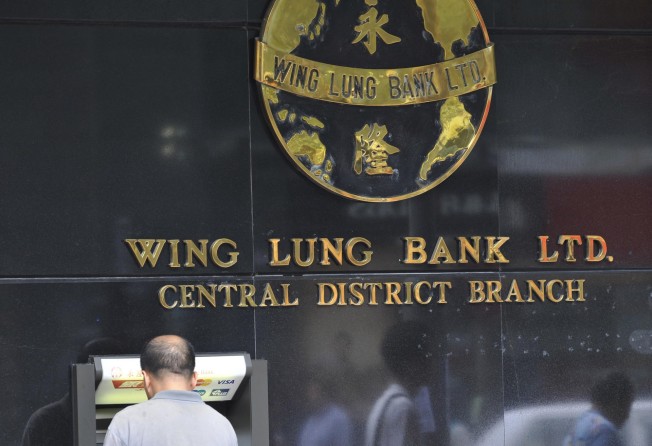
CMB purchase gives Wing Lung new lease of life
Deal proves worthwhile after the HK subsidiary has improved its bottom line and growth rate

China Merchants Bank's (CMB) purchase of Wing Lung Bank from the Wu family five years ago, deemed expensive at the time, has stood the test of time, with the deal - the first acquisition of a Hong Kong bank by a mainland lender - having revitalised Wing Lung.

Back in 2008, some market participants questioned whether the deal was worthwhile and asked whether CMB would have been better off establishing its own branches. Some bankers thought it was overpriced, especially when the bank had to make a goodwill impairment of 579 million yuan (HK$730.4 million) on it just after the acquisition.
A number of mainland banks, including China Minsheng Banking, a strong domestic competitor of CMB, and even Agricultural Bank of China, one of the state-owned Big Four, are eyeing acquisition opportunities among Hong Kong's four remaining family-owned lenders. The targets include Wing Hang Bank and Chong Hing Bank, which have both said they have received expressions of interest in possible takeovers. The price-book ratio of the offers is said to be in the range of two to 2.4.
"The financial figures of Wing Lung have been improving after the sale, on its cross-border referral business," said BNP Paribas' analyst Dominic Chan, adding that it had created an extra income stream for parent company CMB as well.
CMB also helped Wing Lung establish a better platform for yuan business, analysts said.
One market watcher said that as "most of the branches are self-owned, together with the buildings in Mong Kok and Central", revaluation gains on the properties might cover what the mainland bank had paid.
"Before the acquisition, Wing Lung mainly focused on the traditional loan and deposit business. After that, our business scope has expanded," said the head of the bank's deposits department, Kung Chi-ming, who joined the firm in 1981.
Wing Lung is now the third-largest mainland bank subsidiary in the city by asset size. The acquisition of a controlling interest was completed on September 30, 2008, when CMB owned 53.12 per cent of the lender's shares.
Assets have grown faster after the sale and reached HK$210.9 billion at the end of last year, up 77.8 per cent from 2008, compared with a growth rate of 48.5 per cent from 2003-08.
Thanks to referrals from CMB, outstanding loans at Wing Lung have more than doubled since 2008, hitting HK$99.3 billion last year and outpacing the market's 69.5 per cent growth rate, according to the figures from the Hong Kong Monetary Authority. That is in stark contrast to the five years before the buyout, when the bank's growth rate was 48.6 per cent, against the market's 61.3 per cent. The lender has maintained a bad-loan ratio of below 1 per cent over the years.
Wing Lung chief executive Zhu Qi has brought relationships with mainlanders and experts on cross-border business to the local bank and motivated staff with an individual assessment remuneration programme.
One local banker said that although the prices of family-owned banks were high, they were affordable for many mainland lenders and that buying their way into Hong Kong would be less time-consuming than applying for a licence and building their brand and customer base in an organic way. CMB had paid a premium for Wing Lung's existing client base and the experience and professionalism of its management.
Kung said the acquisition had helped Wing Lung boost its profit and growth rate and outperform local rivals. "It would be quite hard to achieve such a level without the backup of CMB," he said.
Wing Lung chairman Ma Weihua, formerly CMB's chairman and chief executive, said the subsidiary would "further strengthen its integration with CMB and place an emphasis on achieving breakthroughs in various businesses with an aim to establishing a competitive cross-border financial service platform".